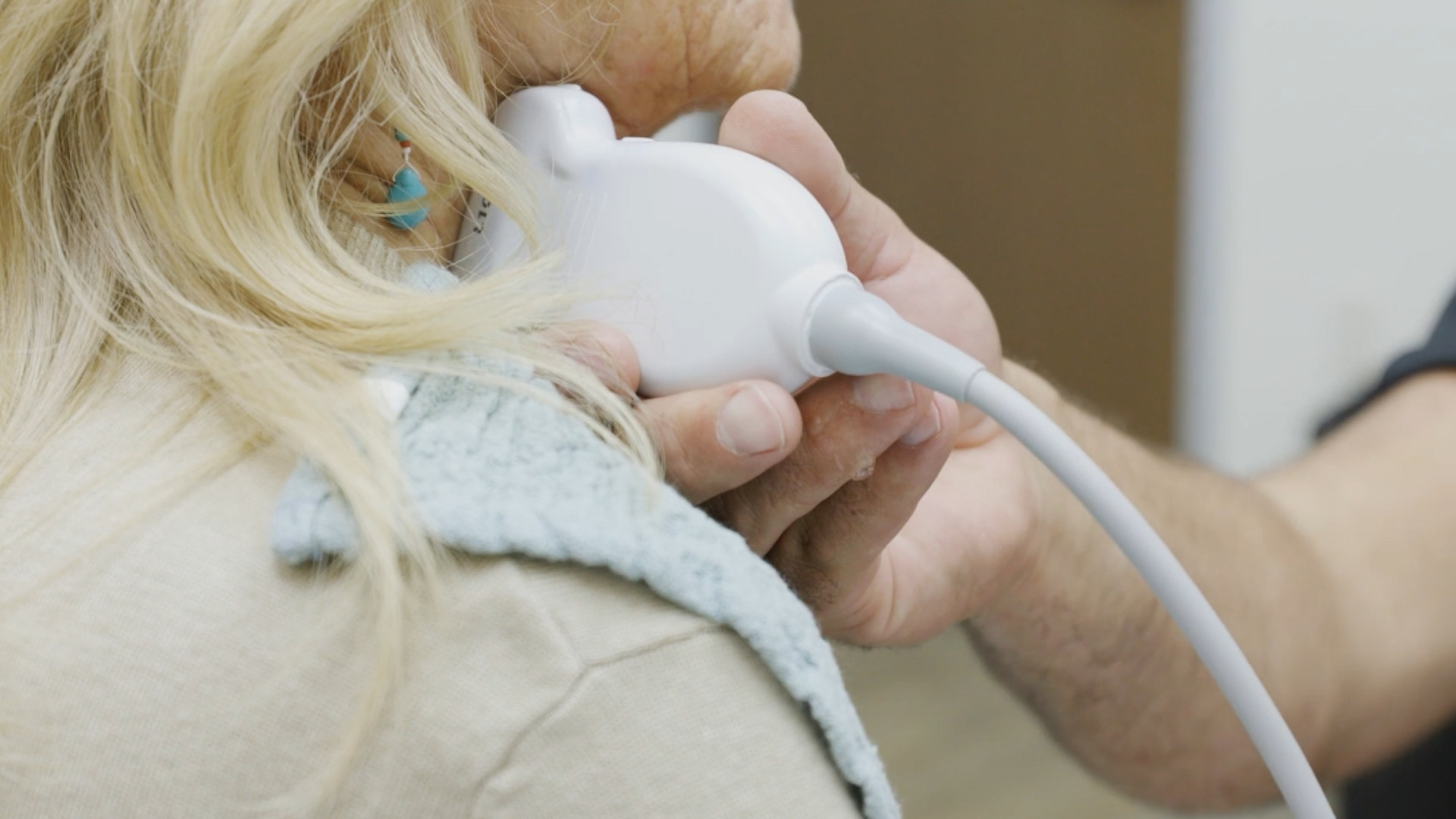Carotids are the arteries found in your neck that provide blood flow to your brain. Plaque can develop in these neck arteries from the build-up of calcium, cholesterol, and/or fatty substances.
Unfortunately, most people won’t notice signs of carotid artery disease in Rogers until after a stroke. In some cases, patients may hear ringing in their ears or actually faint due to the lack of blood flow to the brain stemming from the blockage.
As a result, most patients coming into our office have either just suffered a stroke or don’t know they have CAD. In either case, the Ozark Regional Vein & Artery Center team can provide you with world-class care.
In the hopes of informing more people about the importance of carotid artery disease treatment opportunities and screening, we wanted to provide some information on CAD.
Vascular Health Experts at Ozark Regional Vein & Artery Center
You know Dr. Haney and the team at the Ozark Regional Vein & Artery Center for our work as premier vein experts in Rogers. However, our concierge-level care services have expanded! We can now provide you with world-class vein & artery care in Rogers.
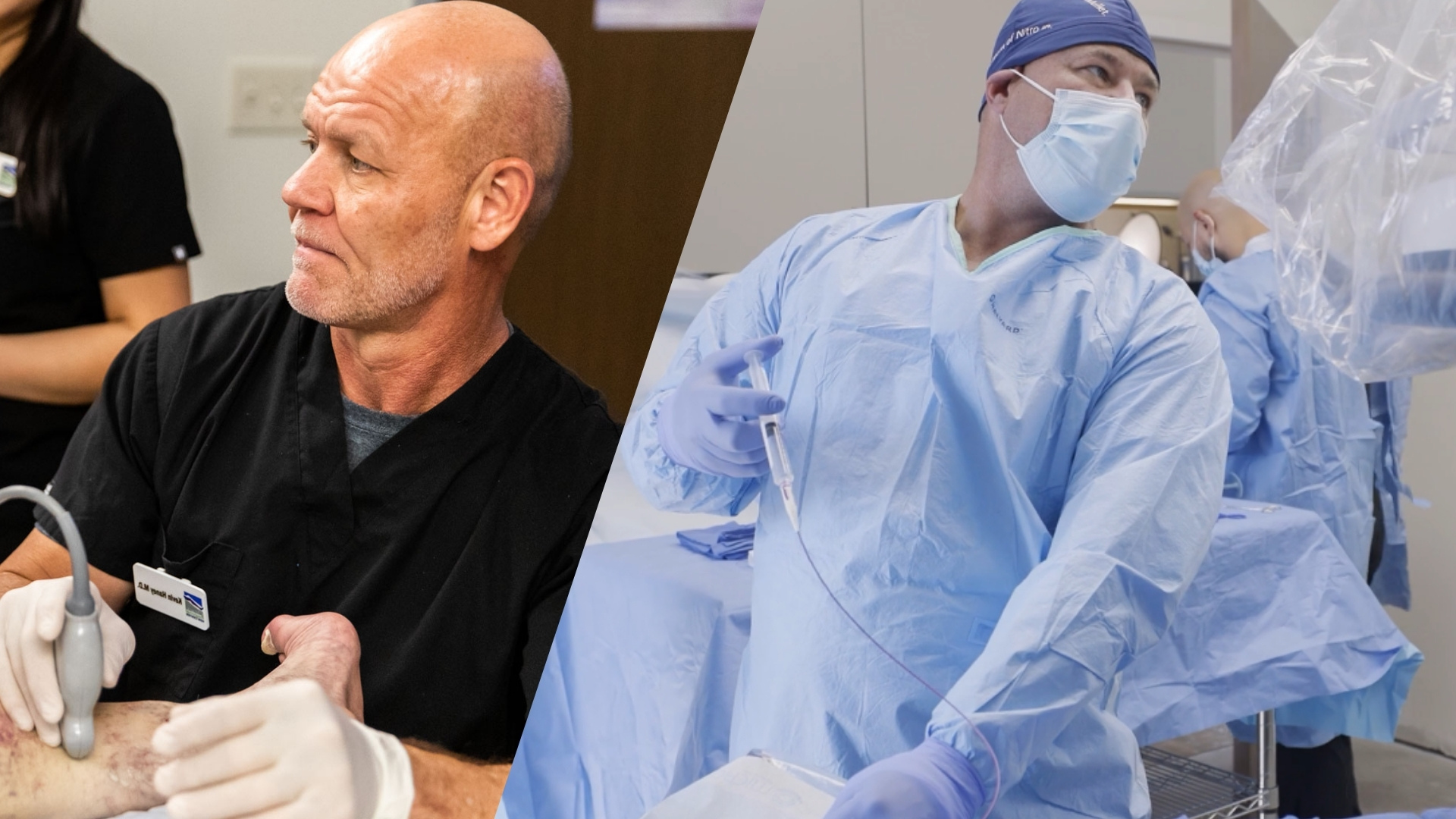
Dr. Stout, the newest member of our family, is a significant contributor to this service expansion. He is a celebrated vascular surgeon who has brought his arterial expertise to the Ozark Regional Vein & Artery Center team. He is a leading expert in diagnosing, treating, and managing arterial conditions. This includes carotid artery disease!
Not just care providers, we also offer our community vascular wellness education. We want to ensure our patients, friends, and neighbors are as informed as possible when making decisions about their vein & artery health. That’s why we’re taking time to review carotid artery disease, the dangers it poses, and the care options available to you in Rogers.
This blog will provide a breakdown of carotid artery disease, notable risk factors for the disease, and the treatment options available in Rogers.
So, What Is Carotid Artery Disease?
Carotid artery disease (CAD) is a condition caused by a blockage or narrowing of the carotid arteries—major blood vessels that provide your brain’s blood supply. You have two carotid arteries, one on either side of your neck. Your brain needs a constant supply of fresh, oxygenated blood to function properly, and there are serious health concerns that arise when that blood flow is even partially interrupted. Specifically, CAD is potentially life-threatening because it can obstruct blood flow to the brain, causing a stroke. This can leave you with permanent brain damage or even kill you.
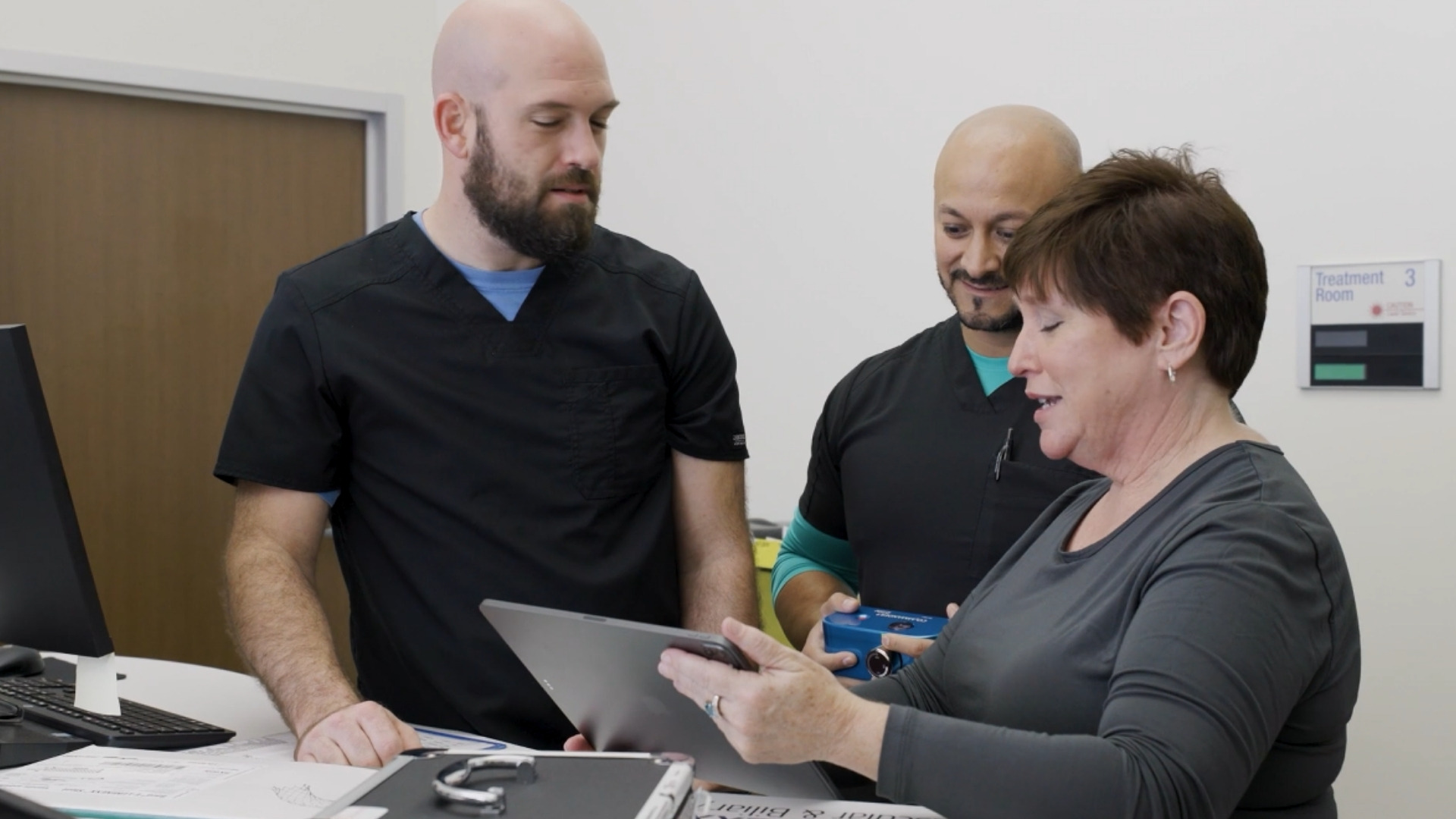
Carotid artery disease causes up to one-third of all strokes for patients worldwide. Treatment for carotid artery disease can dramatically reduce this risk, potentially preventing CAD from developing, worsening, or resulting in fallout health concerns. That’s why we’re so invested in informing our patients about care and treatment opportunities for carotid artery disease in Rogers.
Causes and Risk Factors of Carotid Artery Disease
Carotid artery disease, like other arterial diseases, can develop with atherosclerosis or hardening of the arteries. This condition is a buildup of fatty deposits called plaque.
Plaque can slowly squeeze the artery closed, reducing blood flow. Or a blood clot may suddenly form, blocking some or all of the blood flow to your brain. If the clot closes the artery completely, you may have a stroke.
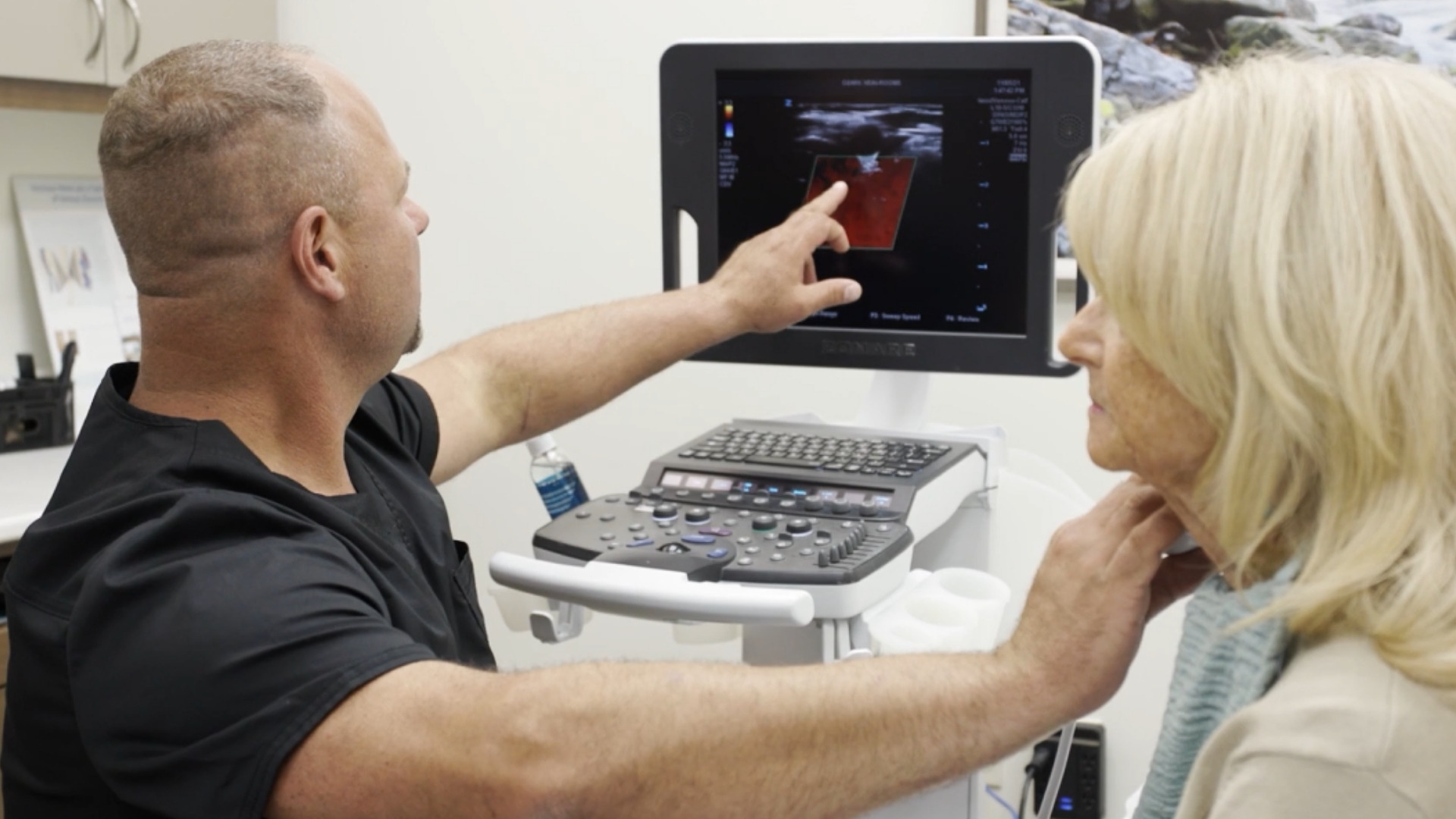
Risk factors for carotid artery disease include:
- High blood pressure. Excess pressure on artery walls can weaken them and make them more vulnerable to damage.
- Tobacco use. Nicotine can irritate the inner lining of your arteries. Smoking also increases your heart rate and blood pressure.
- Diabetes. Diabetes lowers your ability to process fats efficiently, placing you at greater risk of high blood pressure and atherosclerosis.
- High blood-fat levels. High levels of low-density lipoprotein cholesterol and high levels of triglycerides, a blood fat, encourage the accumulation of plaques.
- Family history. Your risk of carotid artery disease is higher if a relative has atherosclerosis of coronary artery disease or if there is a history of strokes in your family.
- Age. Arteries become less flexible and more prone to injury with age.
- Obesity. Excess weight increases your chances of high blood pressure, atherosclerosis, and diabetes.
- Sleep apnea. Spells of stopping breathing at night may increase your risk of stroke.
- Lack of exercise. It contributes to conditions that damage your arteries, including high blood pressure, diabetes, and obesity.
- Trauma to your neck
Carotid Artery Blockage Symptoms
Many people don’t have symptoms of carotid artery disease in its early stages. In rare cases, some patients may hear ringing in their ears or actually faint due to the lack of blood flow to the brain stemming from the blockage.
As the condition advances, the most common first sign of carotid artery disease in Rogers may be a mini-stroke. For some patients, however, a stroke is the first sign of any problem at all.
Understanding Strokes
Strokes are a leading cause of death and long-term disability in the United States. However, strokes don’t have to be disabling or deadly. Knowing the warning signs of a stroke and acting quickly may help you or your loved one escape the most damaging effects.
A stroke can be caused either by a clot obstructing blood flow to the brain (an ischemic stroke) or by a blood vessel rupturing and preventing blood flow to the brain. Another type of stroke is a TIA (transient ischemic attack), or mini-stroke. These mini-strokes are a byproduct of a temporary clot obstructing blood to the brain for a short period. Though CAD can cause both issues, dislodged blockages in the carotid arteries frequently cause TIA. Both these issues are serious health concerns.
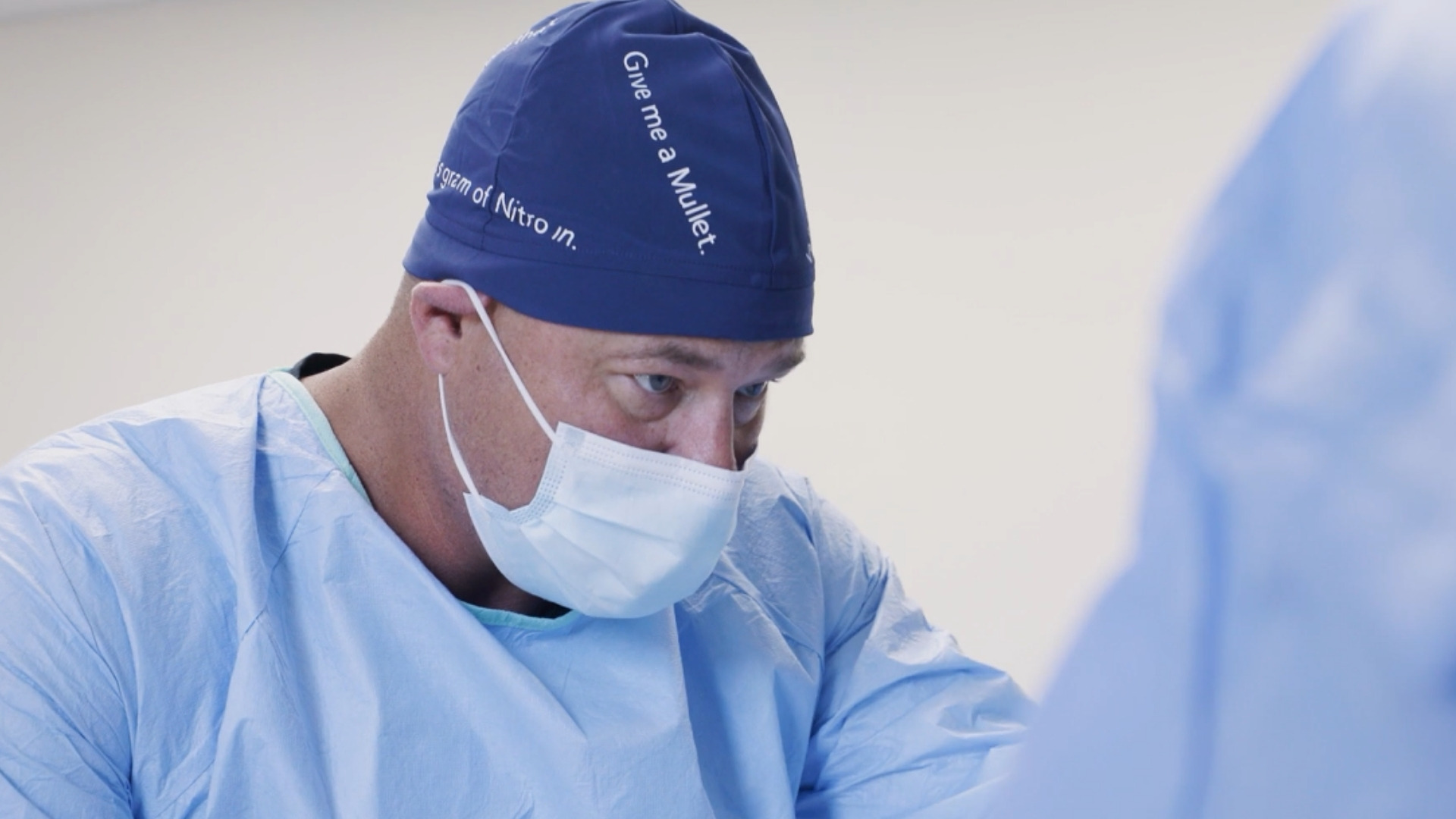
When the blood supply to the brain is reduced, your brain tissue can’t get vital access to oxygen and nutrients. This causes the rapid death of brain cells. Killing brain cells can lead to serious health complications, like long-term brain damage.
If you suspect that you or someone you know is having a stroke, call 911 & seek medical assistance immediately. Quick care can dramatically reduce the chance of long-term damage and potentially save their life.
Symptoms of stroke include:
- Blurred vision or vision loss
- Confusion
- Memory loss
- Numbness or weakness in part of your body or one side of your body
- Problems with thinking, reasoning, memory, and speech
For additional information regarding diagnosing strokes and identifying symptoms, check out a vascular surgeon’s guide to strokes in Rogers!
Diagnosing Carotid Artery Disease in Rogers
To diagnose carotid artery disease, we perform a physical exam. We’ll specifically listen to the blood flow in your neck for a bruit. Your doctor may also have you see a neurologist who can check for signs of a stroke or TIA.
To assess your overall health and likelihood of carotid artery stenosis, we may order blood tests to check your blood sugar, cholesterol and triglycerides.
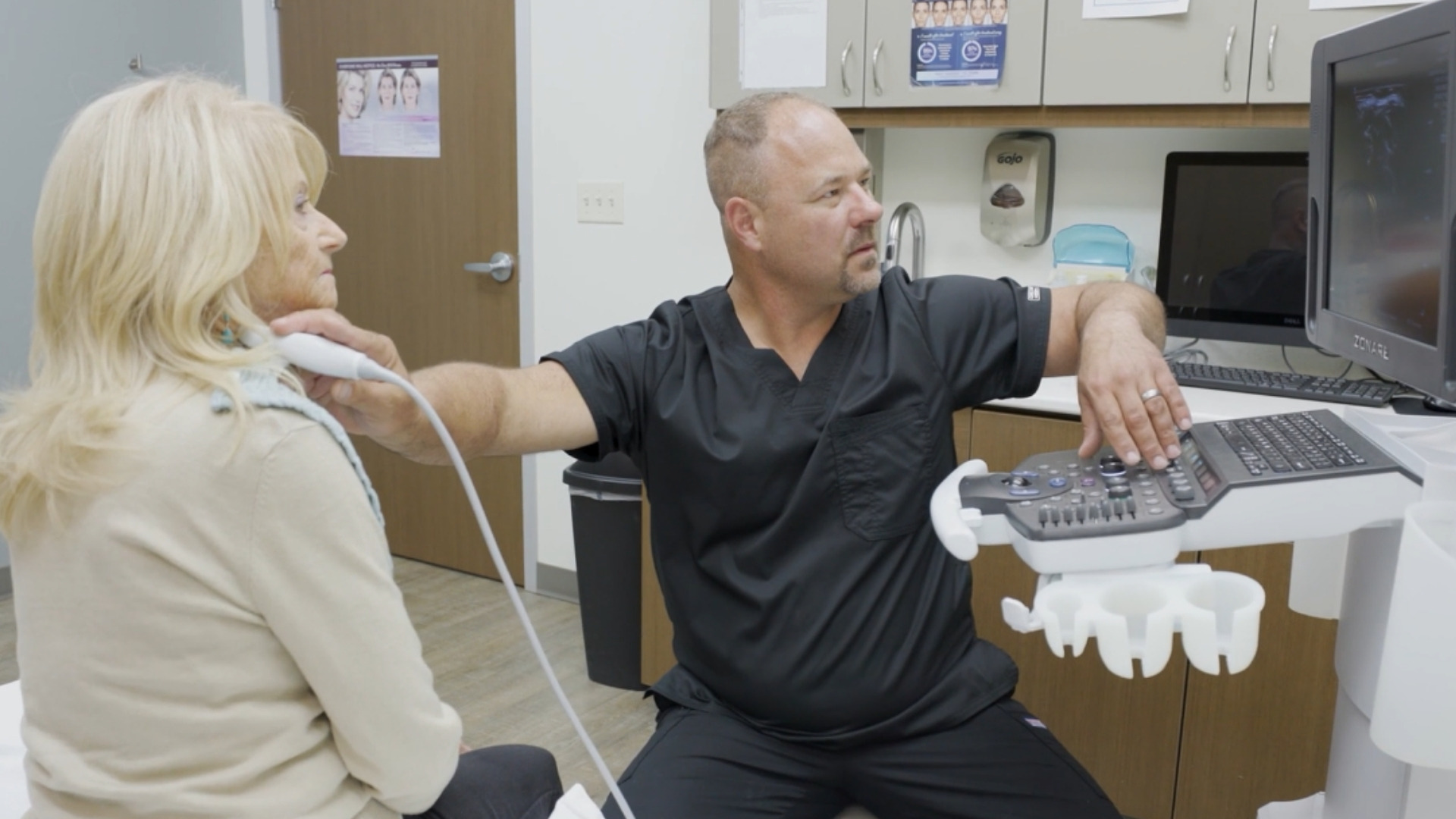
Your doctor may also order imaging tests to examine the blood vessels in your brain and neck. We perform many of these tests in our renowned vascular testing and diagnostic labs. Your tests may include:
- Cerebral angiography: Maps the blood vessels in your brain
- CT angiography (CTA): Uses a contrast material—a tinted dye that stands out against blood—and a series of X-rays to show detailed images of blood vessels.
- MR angiography (MRA): Uses a strong magnetic field to show clear images of a carotid artery blockage
- Carotid duplex ultrasound: Checks how your blood flows through the carotid artery
Can You Cure Carotid Artery Disease?
Treatment for carotid artery disease involves clearing out carotid artery blockages to reduce the likelihood of stroke-causing blood clots.
Your treatment for carotid artery disease at Ozark Regional Vein & Artery Center might include:
- Blood-thinning medications: Medicines including aspirin, clopidogrel (Plavix), dabigatran (Pradaxa), or warfarin (Coumadin) help your blood flow more easily and reduce the risk of clots.
- Carotid angioplasty and stenting: With either type of procedure to clear the carotid artery, we offer expertise in stenting the artery. A carotid artery stent is a small mesh tube. The stent remains in the artery to hold it open, permitting healthy blood flow.
What To Expect From Treatments for Carotid Artery Disease in Rogers
Now, let’s take a deep breath. In and out.
We know this might sound frightening and that any major health issue can be a point of stress. Our goal is never to scare you. We just want to make sure you’re fully informed. The Ozark Regional Vein & Artery Center believes that our patients deserve to have all the information they need to make informed decisions about their health and circulatory wellbeing.

We believe that when making decisions about your health, it’s crucial to have all the facts. Unfortunately, not all of those facts are pleasant. Thankfully, though, there is good news.
CAD, though not curable, is entirely manageable. Especially when we detect it, it’s. It’s essential to pay attention to your well-being and be aware if you have any risk factors for CAD or are experiencing any symptoms. However, it’s important not to jump to conclusions and listen to your body. The odd ache or pain isn’t unnatural and can happen to anyone. However, frequent pain, discomfort, or previously mentioned symptoms warrant further attention.
Preventing CAD
You can do a great deal to improve your arterial health and even prevent CAD. Potentially even avoiding the need for care for carotid artery disease in Rogers! Best of all, it is doable without involving a vascular specialist. After all, conservative treatments and care strategies for preventing carotid artery disease in Rogers are hugely important in mitigating circulatory weakness and arterial disease.
Conservative Care
Our advice is simple: take care of your body.

With attention, we can easily resolve much of the stress we place upon our circulatory system. Though some patients don’t have a say in the matter due to underlying issues, your artery care is up to you for most people.
Care Steps
If you’re looking for more specific steps you can take to improve your artery health, here are a few activities you can do to improve arterial health and overall circulation:
- Avoid Smoking. Smoking is one of the worst things you can do for your vascular system, so our first piece of advice is to stop smoking immediately. Smoking contributes to plaque buildup in the arteries, meaning it’s a major risk factor for developing arterial disease and decreasing quality of life.
- Exercise. Exercising is a great way to improve vascular health, as it keeps blood flowing and prevents further plaque buildup. Walking and cardiovascular exercise are incredibly beneficial, but anything that elevates your heart rate is good. You should make a point of exercising once a day or as much as is feasible.
- Eat Healthier. Diet is a major contributing factor to arterial disease. Foods high in cholesterol are a major cause of plaque buildup and increased blood pressure, so eating healthy is important in improving your health: more fruits and vegetables, less red meat, and dairy. You should also make sure to eat smaller portions in individual sittings to reduce stress on your circulatory system.
- Lose Weight. This is the most challenging item. Being overweight can strain your circulatory system, which requires more work to move blood around your body. Losing weight is vital to improving circulatory function and vascular health.
- Monitor Your Health. Routine health screenings and physicals are critical to maintaining your physical health but can be especially useful for identifying and mitigating arterial disease. Check your blood pressure and cholesterol levels regularly to keep tabs on your arterial health!
Note: It’s important to remember that none of these behaviors should replace consulting a healthcare provider or vascular specialist if you are worried about your vascular health.
Vascular Care
Though at-home conservative care and behavioral adjustments are essential to your vascular health, it’s wise to consult specialists. After all, conservative care can’t erase preexisting plaque; it only prevents further unhealthy buildup and mitigates the potential worsening of symptoms. That’s why there’s so much value in professional carotid artery disease care in Rogers.
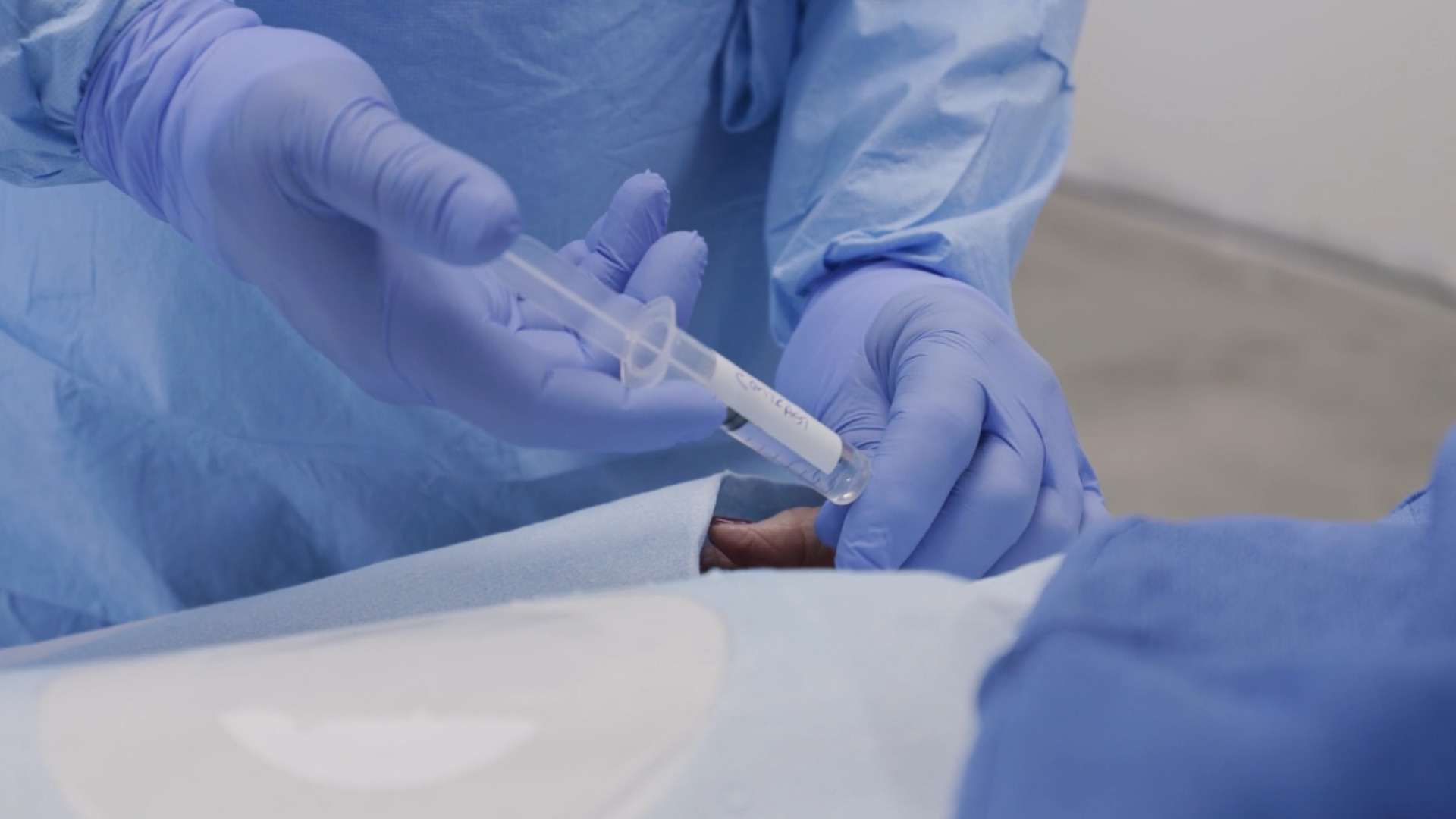
Consulting vascular professionals can help you set informed, long-term treatment plans and medication regimens to mitigate the issue. This style of conservative care isn’t available purely through at-home lifestyle changes or behavioral adjustments.
Medications like statins are vital for lowering cholesterol levels, a critical factor in arterial disease, and require a prescription from a doctor or vascular surgeon.
Additionally, it’s worth discussing surgical or interventional care for improving your vascular health. These care alternatives are only available when consulting a vascular professional equipped with the resources to provide you with comprehensive care.
Read about why you should see an Artery Specialist in Rogers→
Surgical carotid artery treatment options in Rogers
The first step is frequently making health-conscious changes to the patient’s diet, activity levels, and medications. Many people with CAD have poor diets and minimal opportunity for regular exercise. Providing them the nutrients and physical resources necessary to keep their body in fight shape can make combatting the disease’s more serious symptoms easier.
The introduction of antibiotics and statins, regular exercise if possible, and healthier foods can do wonders to improve the health of the patient and prevent more serious health consequences of CAD.
However, in severe cases where medication and conservative care cannot resolve the problem, surgical interventions are the best treatment option available. At the Ozark Regional Vein & Artery Center, Dr. Stout is an expert in providing patients with angioplasty and stenting treatments for carotid artery disease.
Angioplasty
Angioplasty involves the removal of plaque from clogged arteries that prevents vital blood flow to other organs and tissues. Minimally-invasive angioplasty is Dr. Stout’s procedure of choice for treating carotid artery disease in Rogers. It’s a minimally invasive procedure, meaning it’s quick and requires minimal downtime, and it can be completed in our Office Based Vascular Lab in Rogers. No traveling to a hospital, waiting weeks for an appointment, or struggling with uncertainty. We can see and then treat most patients within a week of their screening.
Stenting
Arterial stenting is often paired with an angioplasty, but not always. An arterial stent is a mesh wired tube inserted with a catheter, then expanded in the troubled area of the artery to keep the artery open so blood flow can return to normal. This is a minimally invasive procedure that can take place in our office-based lab.
Safeguard your Arterial Health with CAD Treatments!
If you need support treating carotid artery disease in Rogers, turn to the Ozark Regional Vein & Artery Center. Our experience and constantly expanding suite of care options enable us to guide you toward lasting wellness solutions.
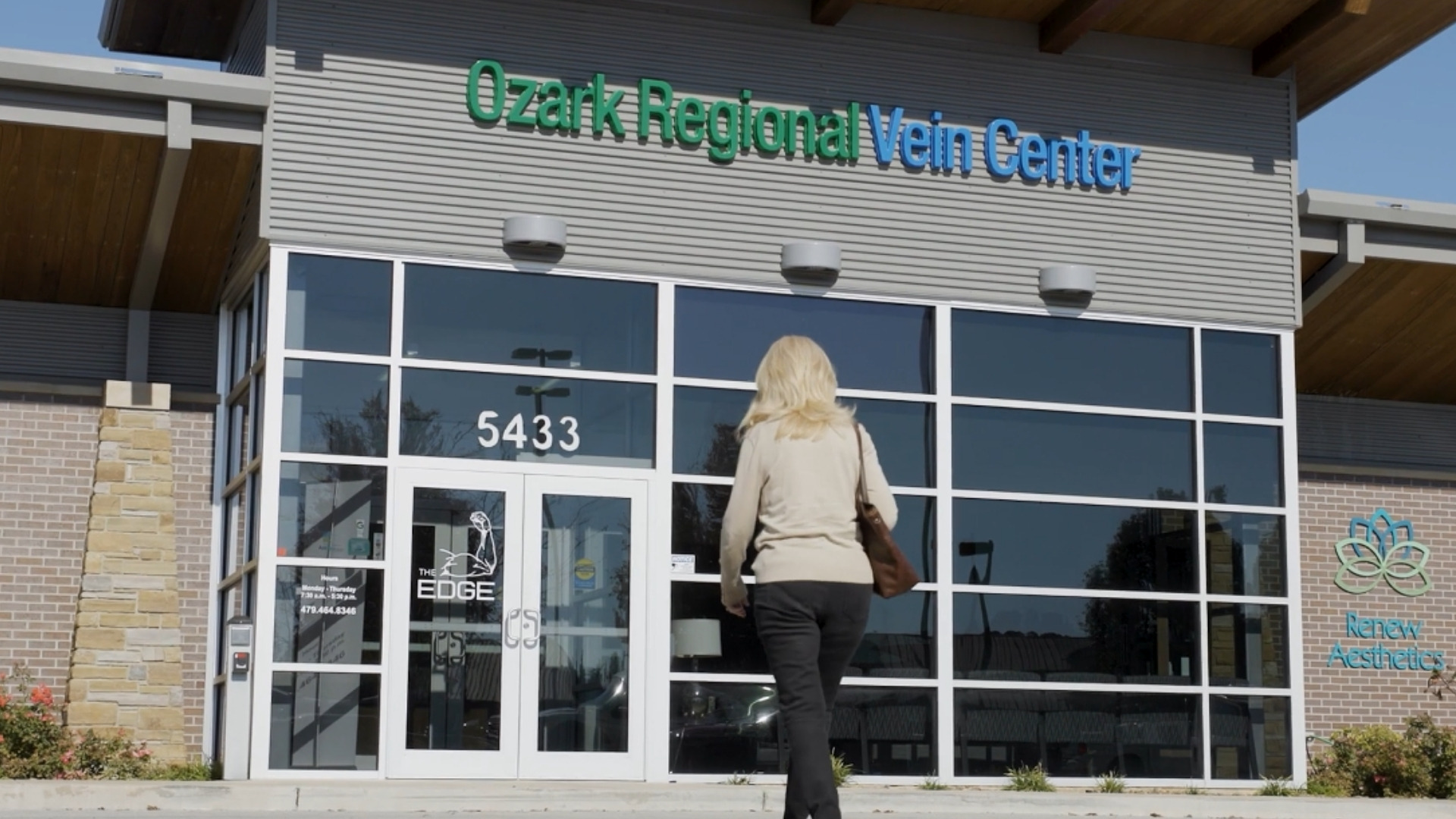
We are a premier practice in Northwest Arkansas for the highest-quality vein and artery treatments. Dr. Haney, Dr. Stout, and the expert staff have over 75 years of combined experience caring for patients’ vascular wellbeing. Helping people is what we do; our mission is to provide the people of Northwestern Arkansas and beyond with the absolute best care possible.
You can count on the Ozark Regional Vein & Artery Center to provide exceptional carotid artery disease care results for our patients each and every time.
So, if you’re at risk for carotid artery disease in Rogers or are interested in regular screening just to be safe, check out our Virtual Vein Screening Tool or schedule a consultation!

